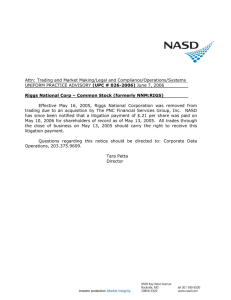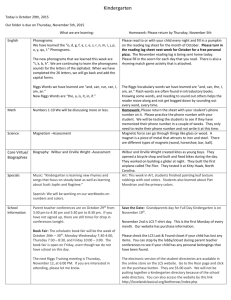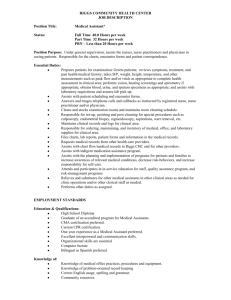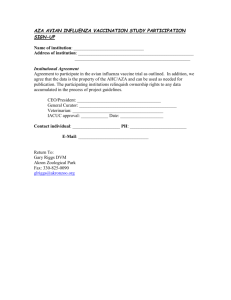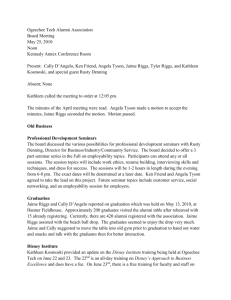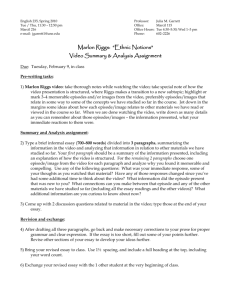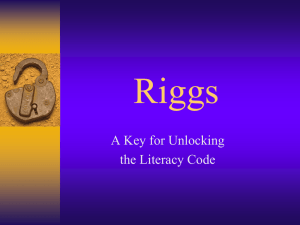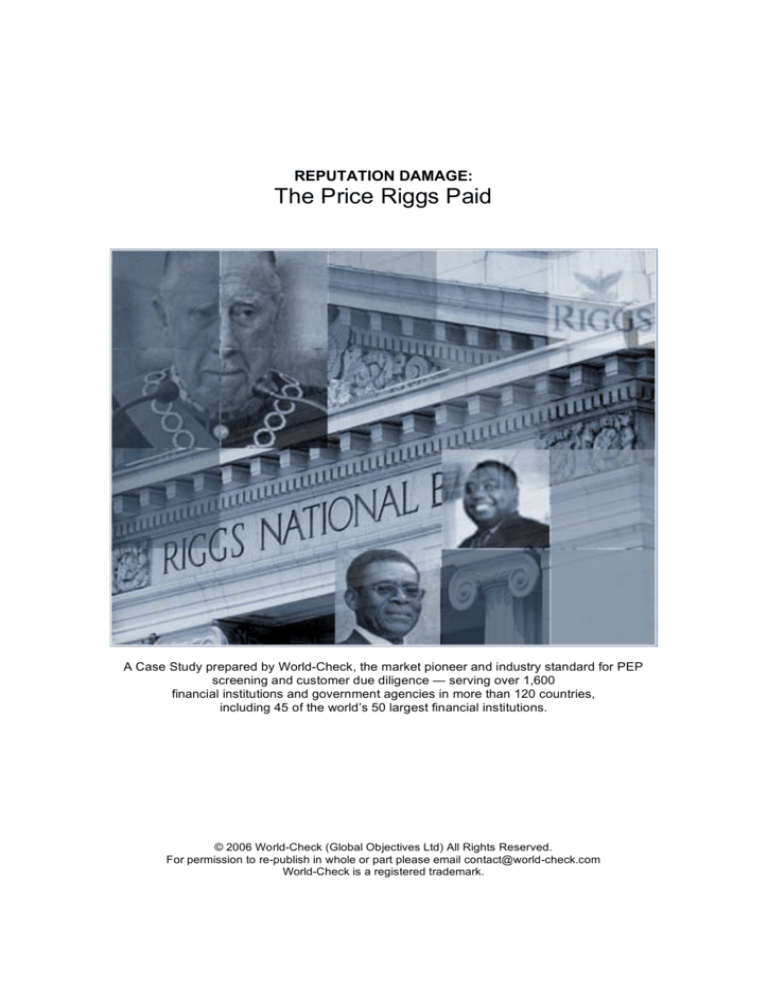
REPUTATION DAMAGE:
The Price Riggs Paid
A Case Study prepared by World-Check, the market pioneer and industry standard for PEP
screening and customer due diligence — serving over 1,600
financial institutions and government agencies in more than 120 countries,
including 45 of the world’s 50 largest financial institutions.
© 2006 World-Check (Global Objectives Ltd) All Rights Reserved.
For permission to re-publish in whole or part please email contact@world-check.com
World-Check is a registered trademark.
Reputation Damage: ‘ The Price Riggs Paid’
CONTENT:
Section
Page
FOREWORD:
By David B. Caruso
Former Executive Vice President of Compliance & Security at Riggs Bank
INTRODUCTION:
RIGGS: ‘Things fall apart’
1
UNDERSTANDING THE ISSUES AT RIGGS:
2
TWO LEADERS, TOO MANY?
2
•
•
RIGGS & PINOCHET
RIGGS & OBIANG
2
3
PRIOR TO ITS ‘PRESIDENTIAL PROBLEMS’
4
THE SAUDI ARABIAN DIPLOMATIC ACCOUNTS
4
THE RESULTS:
5
SHAREHOLDER SUITS AND FINES.
5
RENEGOTIATING THE MERGER.
8
UNDERSTANDING THE EFFECTS:
8
REPUTATION FALLOUT
8
TIMELINE
10
LESSONS TO BE LEARNT
11
WORLD-CHECK: AN OVERVIEW
FOREWORD
by David B. Caruso
Former Executive Vice President of Compliance & Security at Riggs Bank
Riggs is a story about the price paid when an Anti-Money Laundering ("AML")
compliance program lacks proper oversight by management and the board of
directors. As you will read in this paper the outcome of such failure in the
case of Riggs was rather dramatic and as in any good drama there were lots of
twists and turns in the various plots and sub-plots. Who could have imagined
that one, relatively small bank in Washington DC, could have participated in
the questionable financial activities of two of the more notorious dictators of
the last quarter century?
One of the many thing my staff and I learned over the two years we were at Riggs
busy trying to build a compliance program and ultimately uncovering almost all
of the facts you'll read about in this paper, is how harmless most poor
business decisions seem at the time they are made. Bad decisions and their
ramifications take years to be understood. In the case of Riggs it took almost
20 years for errors in judgement to come to fruition.
Beginning in the 1980's Riggs management and ownership launched efforts to
dominate embassy and diplomatic banking in Washington DC. It seemed like a
good idea at the time. It was prestigious, glamorous, and offered the bank's
ownership the opportunity to hobnob with the world's political, economic, and
diplomatic elite. It even provided justification to buy a Gulfstream V jet.
Riggs entered into this market without ever understanding the risks it posed.
Therein lies the failure.
Understanding the money laundering, fraud, and terrorist financing risks
presented by your customers, your products, your services, and the locations
where you operate is the most essential responsibility of an organization in
today's environment.
In the aftermath of Riggs many believed that banking embassies or diplomats was
in and of itself high risk. I don't believe that nor do I believe banking PEPs
is automatically high risk. What is true is that these customers present a
potential for higher risk, and it is the job of compliance, management, and the
board of directors to understand what those risk are, how to mitigate them, the
costs of mitigation, and whether proper risk management is sustainable.
As you read this paper keep in mind that the failures of Riggs to properly
identify its risk and manage them is not unique. Ask yourself how well your
institution knows all of its risks and how well they are controlled.
David B. Caruso was the Executive Vice President of Compliance & Security at
Riggs bank from June 2003 through May 2005. Caruso and his staff were hired to
address concerns raised by U.S. regulators of the Riggs relationship with the
Saudi Arabian embassy and royal family. Over the next two years Caruso and his
senior staff uncovered the fraud involving a Riggs banker and government
officials of Equatorial Guinea as well as much of the history between Riggs and
Chilean dictator Augusto Pinochet.
Caruso and his staff used World-Check to help identify PEPs and other high risk
customers at Riggs Bank.
INTRODUCTION
By David Leppan,
CEO and Founder of World-Check
‘Things fall apart’
For many years, compliance officers have tried to place a value on their institutions’
reputations, often in an attempt to convince reluctant board members and CEOs to
approve increased compliance budgets. This case study offers a unique and valuable
snapshot of the cost of reputational damage and the fallout caused by an array of AML
issues including the lack of proper controls and procedures.
Riggs Bank was no ordinary bank. It was an historic cornerstone in the U.S. financial
community with its origins, as a brokerage house, dating back to 1836, and its
depository and checking services dating to 1840 (Corcoran & Riggs). Often referred to
as the ‘bank of presidents’, some 20 presidents held accounts at Riggs, including
Abraham Lincoln and Dwight D. Eisenhower. It was Riggs that in 1868 supplied the
U.S. government with gold bullion to purchase Alaska from the Russians. Riggs was an
institution. It banked 95% of all embassy accounts in Washington. But in less than
three years, things went horribly wrong for this institution, its management and its
shareholders.
What were the issues? Could your institution face the same fate?
In the pages that follow, we will outline several key events and AML issues that
dramatically affected Riggs’ name, reputation and ultimately its share price.
There is nothing unique about the issues that plagued Riggs and before you jump to
the hasty conclusion that ‘none of this could happen to or at our bank’, might I suggest
you read on.
There is much to be learnt from what happened at Riggs. Compliance Officers and
more importantly the CEOs and Board Members of all financial institutions should take
the time to read this case study illustrating the true cost of reputation damage.
‘The most important bank in the most important
city in the world’
Riggs Bank Advertising Campaign, 1983
Reputation Damage: ‘ The Price Riggs Paid’
1
UNDERSTANDING THE ISSUES AT RIGGS:
TWO LEADERS, TOO MANY?
Riggs, known as the ‘bank of presidents’ ended up with 1 or 2 world leaders too many:
the Chilean former dictator (1973-1990), General Augusto Pinochet and Equatorial
Guinea’s president (since 1979), Brigadier General Teodoro Obiang Nguema
Mbasogo.
Our understanding of the relationships between Riggs and these two leaders is derived
entirely from open source research. Our aim with this case study was not to highlight
the exact or detailed nature of the relationships or the banks shortcomings but rather to
provide an overview of the reputation damage caused to Riggs during a period of a few
years, and more importantly, understand how many of the world’s institutions are
knowingly or unknowingly facing the very same risk..
Riggs & Pinochet
It is reported that Pinochet (or family members/representatives) held a total of 28
accounts1 at Riggs spanning 25 years (earliest account opened in July 1979) and
totalling approximately US$8 million. The bigger picture however is to be appreciated in
a Riggs memorandum in 2002, which stated that the value of the Chilean business at
Riggs had “average balances exceed $100 million”2.
It was while Riggs’s International Private Banking Department was under review during
a routine regulatory examination in April 2002 that the Pinochet accounts came to light.
Riggs had failed to disclose the existence of accounts associated with a Politically
Exposed Person (PEP) in response to a direct request by its regulators. A Senate
report alleged that managers at Riggs Bank had not only failed to comply with AML
legislation but that they had actively aided Pinochet in laundering funds through
offshore accounts and with altered account names. To make matters worse, accounts
had been opened on Pinochet’s behalf in the names of Ashburton Company Ltd. and
Althorp Investment Ltd., both shell companies formed with the help of a Riggs offshore
subsidiary 3.
Pinochet’s accounts were terminated after serious concerns about the oversight of the
accounts was raised by the Office of the Comptroller of the Currency (OCC). The OCC
had 3 main issues with the way Riggs had dealt with the Pinochet accounts. These
were:
1
2
3
http://edition.cnn.com/2005/WORLD/americas/03/16/pinochet.funds/
http://hsgac.senate.gov/_files/PINOCHETREPORTFINALwcharts.pdf
http://www.guardian.co.uk/pinochet/Story/0,,1488929,00.html
Reputation Damage: ‘ The Price Riggs Paid’
2
•
choosing - on the basis that the bank felt Pinochet was no longer a PEP - not to
disclose the Pinochet accounts when the OCC requested a list of all PEP
customers.
•
no suspicious activity/transaction reports were filed when Pinochet moved large
sums of money from accounts at Riggs to other foreign institutions. No
disclosures were made about sums moved from the U.K. and Spain ahead of
attempts to seize Pinochet’s funds by Spanish authorities.
•
lack of documentation on the source of the Pinochet funds.
By the time the investigation was concluded, Riggs would face the largest fine for noncompliance handed down to a bank in the U.S.
Riggs held around 95%4 of the embassy business in the US and 40% in London 5.
The question is not as simple as whether or not your institution is doing
business with corrupt dictators and politicians. The more pedestrian question is
whether your institution is meeting the standard laid out by your regulator.
Riggs & Obiang
In 1995 Equatorial Guinea opened its first accounts at Riggs. This client was to
become Riggs’s biggest depositor with, at its highest point, a balance of around
US$700 million. Riggs held the Equatorial Guinea government treasury accounts as
well as the private accounts of President Obiang, his family and senior government
officials. Some 60 accounts were reported to have contained ‘gifts’ made to the
leadership of this country by U.S. oil companies.
Equatorial Guinea’s oil production had increased tenfold after the discovery of a new oilfield in
1995 (Zafiro field). Diplomatic relations which had been broken off by the Clinton
Administration in the mid-90’s were re-established in 2003 under President Bush as oil from
alternative sources became of great importance.
Accounts held in the first family’s name or in the name of offshore shell companies,
which had been established reportedly with the assistance of Riggs for the first family,
4
US Senate Report: Money Laundering and Foreign Corruption: Enforcement and Effectiveness of
the Patriot Act: Case Study involving Riggs Bank
5
http://www.bizjournals.com/washington/stories/2004/12/27/story1.html?page=2
Reputation Damage: ‘ The Price Riggs Paid’
3
had seen cash deposits of almost US$13 million between 2000 and 2003. In addition,
large payments by oil companies had been made directly into private accounts or
accounts held by officials.
After an investigation by Riggs’ new Compliance staff got underway, the senior banker
responsible for the Equatorial accounts, Simon P. Kareri, was fired in January 2004.
The US Senate Report of July 14th, 2004, found Riggs “had serviced the Equatorial
Guinea accounts with little or no attention to the bank’s anti-money laundering
obligations…”. It was apparent Riggs had been aware of the proceeds of large scale
bribery and corruption. The Report went on to state that the bank had “exercised such
lax oversight of the account manager’s activities that, among other misconduct, the
account manager was able to move more than $1 million from an account belonging to
a ruling family member at Riggs to another bank for an account opened in the name of
Jadini Holdings, an offshore corporation controlled by the account manager’s wife.”
January 27th, 2005, Riggs pleaded guilty to one felony count of failing to file suspicious
activity reports and agreed to be fined US$16 million6. The fine was the largest amount
ever imposed on a bank of Riggs’ size.
On 3rd June 2005, Kareri and his wife, Ndeye Nene Kareri were indicted on 27 counts
of conspiracy to defraud the bank and other related charges including bank fraud, wire
fraud, money laundering and income tax evasion. If convicted they face up to 30 years
in prison and a million dollar fine7.
Simon P. Kareri also opened an account in 1997 at Riggs for Foutanga Dit Babani Sissoko, a
businessman and politician from Mali who was accused of embezzling almost US$250 million
from the Dubai Islamic Bank.
PRIOR TO ITS ‘PRESIDENTIAL PROBLEMS’ …
The Saudi Arabian Diplomat Accounts
The allegations that triggered the initial investigation into Riggs by US authorities
appeared in a Newsweek article in December 2002 (‘9-11 Hijackers: The Saudi Money
Trail’ By Michael Isikoff). The article suggested a ‘steady stream’ of monthly payments
had been uncovered that were being made to Omar Al Bayoumi, who had had dealings
with two of the September 11th hijackers, namely Khalid Almihdhar and Nawaf Alhazmi.
The money, it was reported, had come from the accounts of Princess Haifa Al Faisal,
wife of the former Saudi Ambassador to the U.S., Prince Bandar and daughter to the
late King Faisal of Saudi Arabia.
The article went on to state “After Al Bayoumi left the country in July 2001--two months
before the September 11 terror attacks--payments for roughly the same amount began
6
7
http://www.usdoj.gov/tax/usaopress/2005/txdv050530.html
http://www.usdoj.gov/usao/dc/Press_Releases/2005_Archives/Jun_2005/05182.htm
Reputation Damage: ‘ The Price Riggs Paid’
4
flowing every month to Osama Basnan, a close associate of Al Bayoumi's who also
befriended the hijackers. A federal law-enforcement source told NEWSWEEK that
Basnan--who was recently convicted of visa fraud and is awaiting deportation--was a
known "Al Qaeda sympathizer" who "celebrated the heroes of September 11" at a party
after the attacks and openly talked about ‘what a wonderful, glorious day it had been’.”
March 2004, Riggs announced it was closing all Saudi accounts 8.
In late November 2004, Saudi officials acknowledged that the Princess had given
money to the family of Osama Basnan. The money, it was explained, had been given
as a donation towards medical expenses 9.
Princess Haifa Al-Faisal was finally cleared of the allegations 10. The 9/11 Commission
Report stated: "We have found no evidence that Saudi Princess Haifa al Faisal
provided any funds to the conspiracy, either directly or indirectly.”
1997: Riggs bought J.Bush & Co, a company owned and run by
Jonathan Bush, uncle to the current U.S. President and brother to
former President Bush 11.)
THE RESULTS: SHAREHOLDER SUITS AND FINES
SHAREHOLDERS TAKE ACTION
In April 2004, a shareholders’ derivative complaint was filed against Riggs. The suit
alleged that 11 directors “breached their fiduciary duties of loyalty, honesty and care
and caused a waste of corporate assets and other harms to Riggs by failing to conduct
appropriate due diligence of the Bank’s Middle Eastern and Equatorial Guinea
customers and by failing to exercise reasonable control and supervision over Riggs
and its officers and employees in connection with Riggs’ compliance with applicable
banking laws, including the BSA and federal anti-money laundering laws”12.
This was to be the first of several shareholder suits brought against the bank and its
management.
8
9
10
11
12
http://www.washingtonpost.com/wp-dyn/articles/A29674-2004Jun9.html
http://www.washingtonpost.com/ac2/wp-dyn/A31591-2002Nov23
http://www.saudiembassy.net/2004News/Press/PressDetail.asp?cYear=2004&cIndex=246
http://www.time.com/time/nation/article/0,8599,393590,00.html
http://www.saudiembassy.net/2002News/Press/PressDetail.asp?cYear=2002&cIndex=59
http://www.washingtonpost.com/ac2/wp-dyn/A28396-2004May14?language=printer
http://www.gardencitygroup.com/cases/pdf/RNC/RNCNotice.pdf
http://washington.bizjournals.com/washington/stories/2004/04/19/story3.html
Reputation Damage: ‘ The Price Riggs Paid’
5
THE OCC FINE
13 May 2004, Riggs was fined US$25 million by the OCC for numerous violations of
the Bank Secrecy Act 13 relating to the Saudi Arabian and Equatorial Guinea issues and
the lack of suspicious activity reporting14. No criminal activities were uncovered within
the Saudi transactions.
This amount was the largest civil monetary penalty ever brought against a U.S.
financial institution for violations under the Bank Secrecy Act (BSA), the statute
requiring financial institutions to guard against money laundering 15.
The OCC’s report stated that the banks internal controls “were, and continue to be,
seriously deficient”16. "Riggs failed to properly monitor, and report as suspicious,
transactions involving tens of millions of dollars in cash withdrawals, international drafts
that were returned to the bank and numerous sequentially numbered cashiers'
checks"17.
Riggs’s former chairman and largest shareholder, Joseph Allbritton resigned from the
Riggs National Corporation Board as did Timothy Coughlin, president of Riggs National
Corporation.
TIME TO GET OUT OF THE BUSINESS
By mid-June 2004, Riggs had received preliminary proposals from 7 potential
institutions looking to acquire it.
On July 15th, 2004, the Riggs Board accepted a bid from PNC (The PNC Financial
Services Group, Inc.) of a combination of cash and PNC common stock. The amount
offered was US$24.25 per Riggs common stock.
The very same day, the U.S. Senate Committee on Government Affairs Permanent
Subcommittee on Investigations issued its report, “Money Laundering and Foreign
Corruption: Enforcement and Effectiveness of the Patriot Act; a Case Study involving
Riggs Bank”. The report concluded that Riggs had assisted Pinochet in “evading legal
proceedings related to his Riggs Bank accounts and resisted OCC oversight of these
accounts,” and that the bank had, while managing several accounts for the Equatorial
Guinea officialdom “allowed numerous suspicious transactions to take place without
13
14
15
16
17
http://www.occ.treas.gov/toolkit/newsrelease.aspx?Doc=5AOFP8K.xml
http://www.occ.treas.gov/FTP/EAs/ea2003-79.pdf
http://www.usatoday.com/money/industries/banking/2004-05-14-riggs-fine_x.htm
http://www.msnbc.msn.com/id/4687305/
http://www.fincen.gov/riggs6.pdf http://www.fincen.gov/riggsassessment3.pdf
http://www.occ.treas.gov/ftp/eas/EA2004-44.pdf
http://www.occ.treas.gov/toolkit/newsrelease.aspx?Doc=5AOFP8K.xml
Reputation Damage: ‘ The Price Riggs Paid’
6
notifying law enforcement,”. Finally the report stated that Riggs had “ignored repeated
directives by federal bank regulators to improve its anti-money laundering program.”18
SEPTEMBER 11TH CLASS ACTION
On September 10th, 2004, claims were made against Riggs on behalf of the victims of
the September 11th attacks (Vadhan). The class action was later dropped.
By mid-June 2005, the claims were dismissed and PNC, by then Riggs’ new owner,
made a contribution as part of the agreement to a charitable foundation.
A second action (Cantor) was filed on September 13th. By April 2005, this action had
been resolved.
YET MORE SHAREHOLDER SUITS
By November 2004, a civil lawsuit had also been filed against former Riggs officers and
directors by shareholders (‘Freeport Partners’). The complaint alleged that the banks
action “was the proximate cause of a decline in value of Riggs … and therefore
resulted in injury to Plaintiff’s property” and that this “made the sale of Riggs necessary
and reduced the price at which that sale could be made.”19
November 2004 brought a similar class action and derivative complaint from other
shareholders (‘The Delaware Plaintiffs’).
THE SPANISH CRIMINAL ACTION,
ANOTHER FINE AND THE CEO RESIGNS
On 27th January 2005, Riggs Bank and two members of the Allbritton family, the banks
largest shareholders, agreed to pay $9 million into a fund for victims of Augusto
Pinochet, to settle a case over the bank's role in hiding the former dictator's ill-gotten
gains. 20
On the same day, Riggs pleaded guilty to a single felony count of failing to submit
accurate suspicious activity reports. A fine of US$16 million was levied which was paid
on March 29th, 2005. The judge in the case, Ricardo Urbina, referred to the bank as “a
greedy corporate henchman of dictators and their corrupt regimes.”21
7th March 2004, the chairman and CEO of the parent company of Riggs Bank, Robert
L. Allbritton resigned. The bank’s biggest shareholder was left without any direct board
representation22.
18
19
20
21
22
http://hsgac.senate.gov/_files/ACF5F8.pdf
http://www.washingtonpost.com/wp-dyn/content/article/2005/10/12/AR2005101202163_pf.html
http://www.gardencitygroup.com/cases/pdf/RNC/RNCNotice.pdf
http://www.washingtonpost.com/wp-dyn/articles/A53805-2005Feb25.html
http://www.bizjournals.com/washington/stories/2005/03/28/daily13.html
http://www.washingtonpost.com/wp-dyn/articles/A11383-2005Mar29.html
http://abcnews.go.com/Business/wireStory?id=559779
http://www.washingtonpost.com/wp-dyn/articles/A15462-2005Mar7.html
Reputation Damage: ‘ The Price Riggs Paid’
7
The Washington Business Journal reported on 26th March that Riggs had “spent more
than US$5 million trying to come into compliance, but regulators still aren’t satisfied.” 23
RENEGOTIATING THE MERGER
Early 2005, Riggs submitted its latest financials and an update on its compliance and
legal issues to PNC. In early February, PNC revised its offer from US$24.25 per Riggs
share to US$19.32 per share. The offer was rejected and Riggs filed a suit against
PNC.
On February 10th, Riggs accepted PNC’s revised offer of US$20 per share. PNC had
reduced the price per share by more than US$4.
The revised offer and Riggs’ acceptance thereof brought a second amended
shareholders class action by the ‘Delware Plaintiffs. The action argued that the board
had breached their duty to maximize shareholder value after agreeing to the reduced
PNC offer.
By March 2005, the ‘Delaware Plaintiffs’ and Riggs had reached a settlement. PNC
would finally pay the action group US$2.7 million24.
On May 13th, 2005, Riggs merged with PNC 25.
On July 21st, the Freeport Partners Action reached an agreement in principle with
PNC.
October 2005, PNC, the new owners of Riggs agreed to pay US$5.25 million to settle
the final shareholder lawsuit it faced26.
UNDERSTANDING THE EFFECTS - REPUTATIONAL FALLOUT
From late 2002 until Riggs was sold to PNC in mid-2005, we witnessed a series of
investigations that resulted in fines and settlements totalling US$59 million.
In two year’s time legal and consulting fees topped $35 million.
However the true cost of reputation damage is clearly reflected in the drop in share
price.
June 15th 2004, Riggs accepted an offer made by PNC of US$24.25 per share.
February 10th 2005, Riggs had accepted a renegotiated price of US$20 per share.
An approx. 20% drop in a matter of 8 months.
Instead of achieving US$779 million, the shareholders finally accepted approx.
US$643 million.
23
24
25
26
http://www.bizjournals.com/washington/stories/2004/03/29/story2.html?page=1
http://www.gardencitygroup.com/cases/pdf/RNC/RNCNotice.pdf
http://www.federalreserve.gov/boarddocs/press/orders/2005/200504262/attachment.pdf
http://www.cmht.com/cases_riggsarticle.php
Reputation Damage: ‘ The Price Riggs Paid’
8
During a two year period, the banks CEO, Robert Allbritton resigned (Mar.05), its Chief
Legal Officer, Joseph M. Cahill was replaced (Dec. 04), the COO and Executive Vice
President (and former MD of Riggs Europe), Robert C. Roane was suspended (Sept.
04), and the banks former chief bank examiner and executive vice president, R. Ashley
Lee was put on paid leave (Aug. 04). In addition the manager of Riggs’ African and
Caribbean division, Simon P. Kareri, was fired and ultimately charged with 27 counts
ranging from money laundering to fraud (June 05)27.
"You have rid Chile from the threat of totalitarian government and an archaic economic system
based on state-owned property and centralized planning," Riggs chairman Joe L. Allbritton
wrote Pinochet on Nov. 14, 1997. "We in the United States and the rest of the Western
hemisphere owe you a tremendous debt of gratitude and I am confident your legacy will have been
to provide a more prosperous and safer world for your children and grandchildren."28
THE FINAL BILL
Approx. US$130 million in lost share value.
Approx. US$59 million in fines, penalties and settlements.
Numerous very public resignations.
Hundreds of embarrassing newspaper articles and headlines.
Millions in consulting, auditing and legal fees.
Millions in software and other AML solutions.
A very tainted reputation, and ultimately, one of the most respected banks in the U.S.
closed its doors and its name ceased to exist after more than 160 years of business.
"PNC is buying damaged goods and they understood that going into the transaction," said
Gerard Cassidy, an analyst at RBC Capital Markets. "The amount of damage has increased and
it's worse than the fines. The fines are the easiest part. The bigger question is the damage that is
being done to Riggs' reputation" 29.
27
http://www.washingtonpost.com/wp-dyn/content/article/2005/05/27/AR2005052701471.html
28
http://www.chile-usa.org/p46.htm
29
http://www.zwire.com/site/news.cfm?newsid=13905880&BRD=2185&PAG=461&dept_id=415891&rfi=6
Reputation Damage: ‘ The Price Riggs Paid’
9
TIMELINE
1. May 04: $25 million OCC fine for non-compliance: Saudi Arabia & Equatorial Guinea
2. July 04: PNC agree to pay $24.25 per share. Riggs stock closes at $22.44 (up
32cents).
3. Aug. 04: US begins Riggs probe.
4. Sept. 04: Spanish judge asks US to file charges against Riggs. Riggs sued over
9/11.
5. Civil suit, class action and derivative compliant brought against officers and directors
by shareholders.
6. Jan. 28th: Riggs admits guilt in failing to report suspicious transactions & accepts fine
$16m. Riggs also agrees to pay US$9 million to fund for victims of Pinochet.
7. 7th Feb - Riggs shares drop 5% after PNC deal collapses. 8th Feb. - Riggs shares
tumbled $1.21, or nearly 6 percent, to $20.02. 10th Feb. PNC agree to buy Riggs at
$20 per share. Shares in Riggs fell 59 cents, or 2.9 percent, to $19.63 on the Nasdaq.
28th - $9 million fine: Pinochet
8. Mar. 05: Riggs admits 28 Pinochet accounts, not 9. CEO resigns. Mar. 29th Riggs
pays the $16m Pinochet fine.
9. 13 May 05 – Riggs acquired by PNC
1
2
3
4
5
6
7
8
9
Copyright Marketocracy
http://www.marketocracy.com/cgibin/nphpvs?1&D&MO_Stock_Chart&550,400&stockID=3290&ticker_symbol=RIGS&maxDays=365
Reputation Damage: ‘ The Price Riggs Paid’
10
LESSONS TO BE LEARNT:
What must be apparent is that Riggs’ issues were less about banking on behalf of
PEPs and much more about what the regulator expects from an institution. Riggs was
fined primarily because of a lack of vigilance and procedure only made worse by the
purposeful attempting to conceal activities of great concern to the regulator once under
investigation. As compliant as Riggs might have been on OFAC, its basic KYC, AML
and suspicious reporting procedures were grossly lacking.
Some of the following suggestions may seem basic but there are too many institutions
that have not yet committed themselves in the way the regulators would approve of.
LEGAL & COMPLIANCE RISK:
•
Ensure your employees are well (and regularly) trained on legal and compliance
issues.
•
Ensure the Legal & Compliance departments are properly staffed, have the
systems and procedures in place to meet all legislative requirements and that
they have a budget to do so. Cutting corners will cost you more in the long
run…including, quite possibly, your job and your own reputation!
•
Ensure compliance are empowered to do what needs to be done within your
institution.
•
Ensure your compliance team is not made up of only lawyers. Former
enforcement and agency staff may be far better trained in investigative methods
and are more likely to know how to catch a thief/fraudster/money-launderer etc.
Compliance is not only about complying with the law. It’s about understanding
and evaluating risks.
PEP RISK:
•
Ensure your institution is 100% aware of all of its customers that are PEPs - in
the broadest sense - no matter how many years ago they were in office.
•
When asked by regulators to disclose all PEPs, do so. Rather err on the side of
caution.
•
Do not assist or turn a blind eye to PEPs concealing their identity whether by
using alternative spellings of their names, aliases or corporate structures.
•
Do not assist PEPs in setting up (offshore) corporate or trust structures without
being prepared to disclose your assistance in the matter.
•
Report all major transactions and large cash deposits related to a PEP
especially if they are deposits/gifts by large corporations.
Reputation Damage: ‘ The Price Riggs Paid’
11
•
Ensure multiple sign offs on all PEP business by officers that are well trained in
compliance and legal requirements.
•
When dealing with diplomatic account holders, be aware of the geo-political
risks and conditions in their country.
•
Within banking institutions, set up PEP-Desks i.e. a PEP Department with a
team of private bankers who are well trained in compliance issues and know
how to deal with PEPs.
CORRESPONDENT RISK:
•
Ensure you carry out regular audited due diligence on all correspondent banks,
their ownership and management.
•
Continue to review your correspondent banks and the countries they are based
in for risk issues.
•
The same is true for referrers of business, law firms and other service
providers.
EMPLOYEE RISK:
•
Ensure checks and balances are in place and that no (private) banker or trader
goes unsupervised, no matter how much of a ‘star’ they are.
•
Bankers responsible for PEPs need additional scrutiny. Have several people
sign off on all major PEP transactions.
•
Ensure your employees are well trained in their legal and compliance
requirements.
•
Should you bank deal with PEPs from heightened risk countries, ensure your
employees are educated and kept updated on the risks that country poses.
•
It is often the case that employees pay an unfairly high price for failure by an
institution or its management. One seldom hears about how many people have
lost their jobs because of a scandal that brought their employers to their knees.
One should also consider…
Reputation Damage: ‘ The Price Riggs Paid’
12
SHAREHOLDER RISK
•
the risk of management being sued because of incompetence or noncompliance.
MANAGEMENT RISK
•
the risk of being sued by shareholders, being investigated by the government
and ultimately going to jail
JURISDICTIONAL RISK
•
in smaller jurisdictions a case of this nature and magnitude would have a knockon effect on the entire financial community.
…however of primary concern must be one’s …
REPUTATION RISK:
•
Understand that your institution is only as good as its name and reputation.
•
Ensure all board members, management and employees understand this.
•
Set out to improve your reputation every day and do so by measuring,
understanding and mitigating your risks.
•
Never underestimate the ‘bad guys’ – they are craftier then you think. They set
out everyday to do what they need to do. You have to set out every day to
prevent them from doing it at your institution.
•
Set up a Damage Control Team to include internal and external marketing
teams for when it does go wrong. Have a strategy to put out fires.
•
Understand that a good compliance team should not be seen as a department
that ‘costs money’ but rather as a ‘reputation protection department’ that could
save you millions (and your job!).
•
Accept that the mass media would love nothing more than to cover their front
pages with articles of ‘greedy bankers doing business with the bad guys’.
•
As your institutions shares plummet, the company is put up for sale and
lawsuits are brought against you, remember you were warned.
Reputation Damage: ‘ The Price Riggs Paid’
13
WORLD-CHECK
OVERVIEW
World-Check was founded in late 2000 to meet the specific requirements of the Swiss
financial industry.
Today, 5 years on, World-Check intelligence is relied upon by 1600 institutions in more
than 120 countries, including over 200 government, enforcement and regulatory
agencies in over 90 countries.
45 of the world’s 50 largest financial institutions choose to use World-Check. We serve
more institutions than all other PEP vendors put together.
World-Check’s coverage includes PEPs, money launderers, fraudsters, terrorists and
sanctioned entities — plus individuals and businesses from over a dozen other
categories. World-Check offers a downloadable database for the automated screening
of an entire customer base, as well as a simple online service for quick customer
screening.
Please visit www.world-check.com for further information
or contact World-Check at contact@world-check.com
www.world-check.com
© 2006 World-Check (Global Objectives Ltd) All Rights Reserved.
For permission to re-publish in whole or part please contact@world-check.com
World-Check is a registered trademark.

